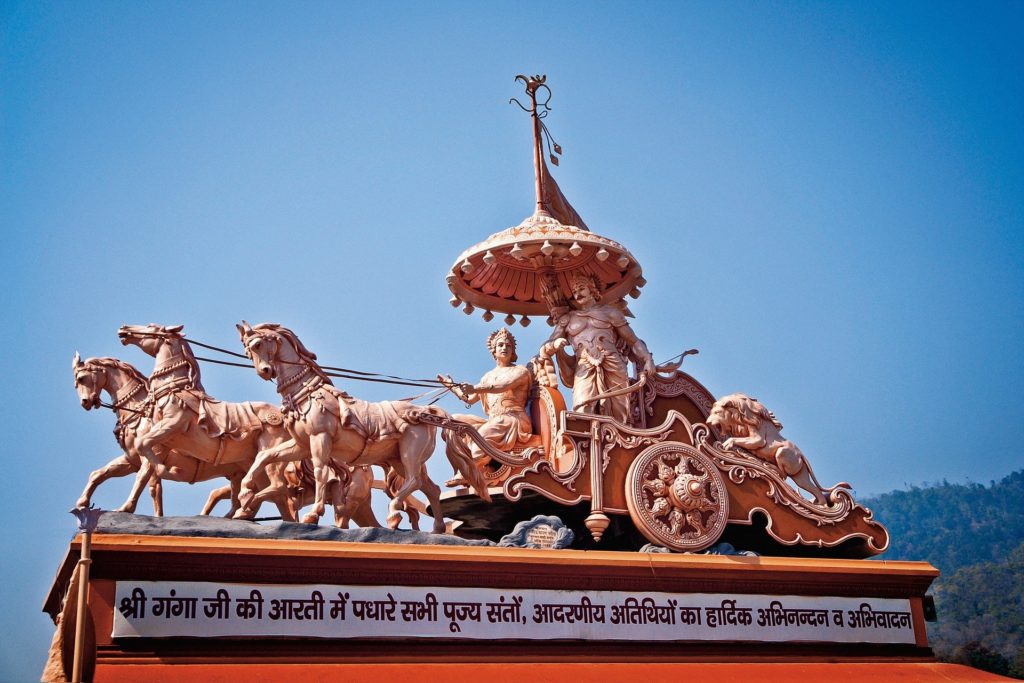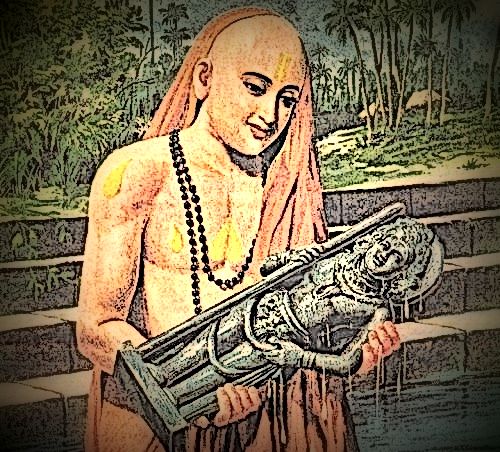
karmanye vadhikaraste ma phaleshu kadachana
ma karma phala-hetur bhur ma te sango ‘stv akarmani
(Bhagavad Gita, 2.47)
–
You certainly have a right to perform your prescribed duty, but you are not entitled to the fruits of your actions. Never consider yourself to be the cause of the results of your activities, and never be attached to not performing your duty.
When Arjuna was perplexed and hesitated to fight against his kins in the battlefield of Kurukshetra, Lord Krishna coached him in the science of yoga. The conversations that took place between Krishna and Arjuna in the battlefield of Kurukshetra, comprise the contents of Bhagavad Gita. Krishna and Arjuna discussed a host of subjects. Amongst them were yoga, characteristics and immortality of the soul, one’s duties, the objectives of one’s life, afterlife, God, the dynamics of the material world and the key to transcending it. Bhagavad Gita was spoken by Lord Krishna to Arjuna about 5000 years ago at the onset of the great war of Kurukshetra and their discussion is considered to be one of the most celebrated philosophical and religious dialogues known to man.
Actions without Attachment to results (ma phaleshu kadachana)
In the above verse 2.47, Lord Krishna instructs Arjuna to fight and not shy away from performing his duty. He explains that one should never refrain from fulfilling his/her prescribed duties irrespective of the outcomes of his/her actions. In other words, one should never be attached to the fruits of the actions and should only concern himself with executing them. The Lord here also emphasizes that inaction (akarmani) is sinful and one should conduct the prescribed duties under all circumstances. Prescribed duties can be categorized into routine work, emergency work, and desired activities. Actions, not opposed to scriptural injunctions, that are performed without attachment to the outcome, doubtlessly lead one to the path of liberation. An aspirant of the highest knowledge must know that to hanker or yearn for a reward for one’s actions is the cause of material bondage. But it may be said that all actions produce a result, just as eating satisfies the urge of hunger. The Supreme Lord hence states that one should not let the anticipated results be the cause of motivation for performing the respective actions.

Arjuna, who was reluctant to raise arms against his family members (Kauravas) on the battlefield of Kurukshetra was advised by Lord Krishna to fight. Arjuna was a Kshatriya (warrior) and it was his duty to fight for a rightful cause. Therefore, the Lord advised him to fight without bothering about the outcomes of the war. Even non-participation in the battle was another side of his attachment. Any attachment, positive or negative, causes material bondage. Therefore fighting to perform his duty as a warrior (Kshatriya) was the only auspicious path to salvation for Arjuna.
While giving his purport to this verse, Srila Madhvacharya comments that an embodied soul influenced by mundane desires is deemed to be reprehensible. Even the desire for heavenly enjoyments is to be shunned as they are tainted with fruitive rewards as well. Therefore for those possessing spiritual intelligence, motivation for the desire for reward is not advisable. Arjuna is certainly spiritually intelligent and being the son of Indra the ruler of the demigods he certainly has sufficient ‘adhikara’ or qualities. Only for the purpose of giving His unequivocal instructions for posterity has the Supreme Lord Krishna utilized him to benefit all the worlds.
Equanimity in both success or failure
In the very next verse, Lord Krishna reiterates His instructions to Arjuna and instructs him on Nishkama Karma Yoga as follows.
yoga sthah kuru karmani sangam tyaktva dhananjaya
siddhy asiddhyoh samo bhutva samatvam yoga uchyate
(Bhagavad Gita 2.48)
–
Execute your duty being equipoised, O Arjuna, relinquishing all attachment to success or failure. Such equanimity is called yoga.

Hereby, Krishna guides Arjuna on how one should be equipoised in both success and failure. Considering victory and defeat as equal, Arjuna should execute his duty of fighting. This equanimity of one’s mind concerning success and failure has been termed as ‘Yoga’.
Being equipoised – How can one achieve this state of mind ?
Sridhara Swami explains that yoga is the science of union between jiva and the Supreme Lord. By relinquishing attachment, and motivation for rewards, one should depend solely upon the mercy of the Supreme Lord in all of one’s activities. One should perform his/her actions only as an offering unto the supreme Lord, being totally unattached to the results. This is confirmed by Lord Krishna, later in the Bhagavad Gita –
yat karosi yad asnasi yaj juhosi dadasi yat
yat tapasyasi kaunteya tat kurusva mad-arpanam
(Bhagavad Gita 9.27)
–
O son of Kunti (Arjuna), all that you do, all that you eat, all that you offer or give away, as well as austerities you may perform – do that as an offering to Me (Krishna).

In order to survive in this material world, everyone needs to perform specific actions. Everyone has to work to preserve the body and soul together. Lord Krishna here recommends that one should work for Him and execute all their prescribed duties as an offering unto Him. In this way, dovetailing all actions, towards pleasing Krishna, and meditating on Him all throughout the day, one can unite with the Supreme Lord most intimately. Such a person is situated in the highest stage of Yoga. This is confirmed in chapter 6 of Bhagavad Gita –
yoginam api sarvesam mad-gatenantar-atmana
sraddhavan bhajate yo mam sa me yuktatamo matah
(Bhagavad Gita, 6.47)
–
And of all yogis, he who always abides in Me with great faith, thinks of Me within himself, worshiping Me in transcendental loving service, is the most intimately united with Me in yoga and is the highest of all.
One needs to understand that though the living entities are entitled to actions, only the Supreme Lord can bestow the results. The Supreme Lord is the cause of all causes (sarva karana karanam). Hence, one who performs actions being motivated by fruitive results, is under the illusion that he/she is the cause of the outcome. One should understand that it is fallacious to believe that one is the ultimate controller of their own destiny because all results are ultimately ordained by the Supreme Lord.